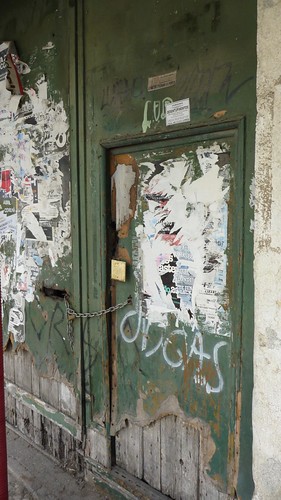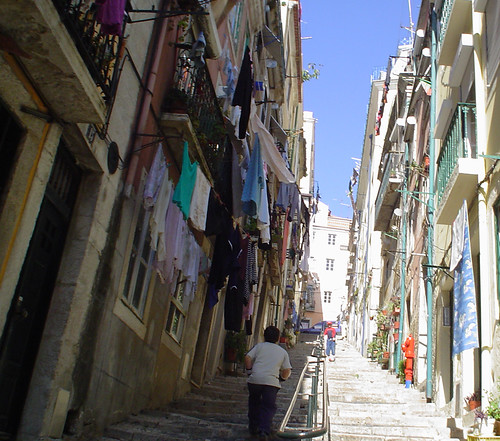 Michael Moore has been appearing and speaking in alot of interview programs that I happen to listen or watch over the past week, in connection with his new movie – Capitalism: A Love Story. Moore certainly doesn’t need any help from me, nor will it come as much of a surprise that I’m a great admirer of his since I was about 17 years old. But recently during one of these interviews he starting talking about a topic that got me thinking about my own experience. The topic of credit cards.
Michael Moore has been appearing and speaking in alot of interview programs that I happen to listen or watch over the past week, in connection with his new movie – Capitalism: A Love Story. Moore certainly doesn’t need any help from me, nor will it come as much of a surprise that I’m a great admirer of his since I was about 17 years old. But recently during one of these interviews he starting talking about a topic that got me thinking about my own experience. The topic of credit cards.
Speaking about how credit card companies target young people by setting up right on college campuses on day 1, regardless if you have a job or any income at all, they want to sign you up. Moore goes on to talk about the high rates of debt among students, to the point that between credit card debt and college loans, when they graduate they owe more than they will make for many years to come. You might hear or read these statements (If you went to school in the US) and think to yourself: that didn’t happen to me. Or you’ll remember those credit card companies outside the student center, offering free gadgets and saying hello to you in that irritatingly friendly way.
Now comes the story I’d like to tell about one big difference I experienced when I moved to the Netherlands.
Currently this is the 8th year that I live in Amsterdam, having moved only about a year after graduating from university in New Jersey. When I got here I was a student, as well a European citizen, so getting a social security number, bank account, and most of the essentials, was a fairly smooth process. If there was an occasion I needed a credit card, I still had a trusty US credit card to fall back on, never mind the terrible exchange rate. But after two years as a grad student I was finished with zero school or credit card debt (fortunately I’ve never had debt in my life) and I found myself a part time job at the U of Amsterdam and a number of freelance editing, translation, and writing jobs. Around that same time I kept seeing advertisements at the airport and through my bank for a certain credit card company. Considering the exchange rate and the times where I could have really used it, I finally took one of the forms to fill out. Though I had heard its much harder in Europe, I also kept thinking back to freshman year at college and how easy it was. Just fill out the form and choose the funny graphic layout for the card.
Two or so weeks after sending in my forms I get a call. “Mr.Bicyclemark, we’re just going over your form and we wanted to confirm some things, it says here you’re self employed?” Indeed at that point I’d started my own company to make getting freelance jobs and handling the expenses and income a little easier. “Yes” I said, “I’m a freelance journalist, editor, and sometimes web consultant.” “OK very good. I’ll just need to know your yearly income..” She’d cut right to my achilles heel, as a freelancer and part time employee, my income was pretty embarrassing by most adult standards, I was and still am, a specialist of living on a shoestring budget. I fumbled through an answer “Well its hard to say as a freelancer, you know, some months its a good amount, some months it is hardly anything…” The credit card lady tries to help me along, “So about 20K per year?” I had this feeling that if I told her the truth, that is was surely less, that I wouldn’t qualify for their minimum, “Yes,” I answered confidently, “about that much.” What the hell, I figured, as long as I don’t have to prove it, I’ll be fine. “.. and we’ll just need some further information so we can confirm this..” – Shit I thought. Plan foiled. I quickly told a lie about having to go but that I would be in touch. She didn’t even fight me on this, wished me a good day and recommended I get back to her when I had a better idea of my income.
It would take me another 2 years to get a credit card, when I sent in another application hoping they wouldn’t remember the first. I got that call again, only this time I tried harder to lie my way into getting one. Once again I argued that as a freelancer my income didn’t always fit into one of their boxes, but that I manage a decent living and somehow deserve this credit card. After alot of convincing, and a much stronger arguement than my first attempt, I got my card which to this day I hardly ever use.
Why the long story? It is amazing the difference between what it took for me to get a credit card in the US compared to getting one in Europe 10 years later. Beyond it being impressive, I wonder if this difference doesn’t reflect on part of why so many problems have arisen with people and credit card debt. Not to mention banks that take advantage of people by inventing surcharges. Not that Europe is perfect, or that someone can’t eventually get a card who perhaps can’t really afford it, but in my experience, there is a real difference in how less easy it is to fall into this trap.
 Almost a year since my first visit to the Republic of Georgia, I am back in Tbilisi, working here for one week. And while last year many of my conversations and observations were related to conflicts and recent history, this year I’m going beyond the surface and learning about the many layers Georgia today. What strikes me, more anything else, is that no matter who I speak with, there is a flat out – lack of hope in this country.
Almost a year since my first visit to the Republic of Georgia, I am back in Tbilisi, working here for one week. And while last year many of my conversations and observations were related to conflicts and recent history, this year I’m going beyond the surface and learning about the many layers Georgia today. What strikes me, more anything else, is that no matter who I speak with, there is a flat out – lack of hope in this country.

 One key point that I didn’t manage to get into for the piece I wrote about Portugal on the
One key point that I didn’t manage to get into for the piece I wrote about Portugal on the 
 Michael Moore has been appearing and speaking in alot of interview programs that I happen to listen or watch over the past week, in connection with his new movie – Capitalism: A Love Story. Moore certainly doesn’t need any help from me, nor will it come as much of a surprise that I’m a great admirer of his since I was about 17 years old. But recently during one of these interviews he starting talking about a topic that got me thinking about my own experience. The topic of credit cards.
Michael Moore has been appearing and speaking in alot of interview programs that I happen to listen or watch over the past week, in connection with his new movie – Capitalism: A Love Story. Moore certainly doesn’t need any help from me, nor will it come as much of a surprise that I’m a great admirer of his since I was about 17 years old. But recently during one of these interviews he starting talking about a topic that got me thinking about my own experience. The topic of credit cards.